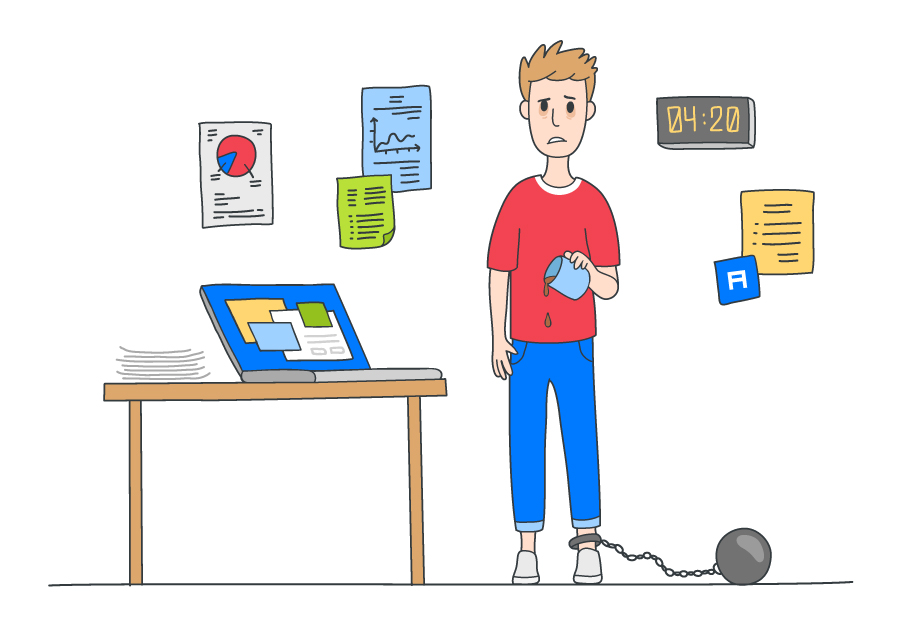How to create a startup empire without selling your freedom

Easy to find a job in a startup. Finding such a startup founder whose worldview you share is difficult.
I am sitting next to a founder whose worldview has admired all of last year.
')
We are sitting in the Starbucks in the center of Singapore, here it is impossibly noisy, but perhaps now this hubbub is of the least concern for both of us.
We met to discuss bad news.
He had just been kicked out of a startup, which he himself had founded two years ago.
He did not even suspect that investors and co-founders were carrying a monstrous plan behind his back.
“I no longer want to work with you,” one of the investors told him, and the two co-founders sat on the other side of the table and watched in silence for all of this.
He had to not only resign the CEO: he was also forced to part with the few actions that he left for himself in his own startup.
Over the past few months, his dream - to make a product that customers like - has gradually turned into work on a product that investors want.
And the same investors wanted to drive him out.
Transferred to Alconost
Small is a new big
Investors are not evil . After all, most of them sincerely wish to invest in their investments not only money, but also value.
However, you can create a startup empire not only with the help of investors.

There is an alternative path, beaten by the founders of another variety; they have recently been called the collective term “bootstrappers . ” These are entrepreneurs who build their businesses with minimal or no external financing.
Recently, more and more bootstrappers began to talk about themselves and about their path. However, they usually do not broadcast as loudly as those who give away fortunes to PR agencies to announce their next million tranches received from venture capitalists.
You will not see a bootstrapper who is preparing an investment presentation at a time when the team desperately needs it. They do not bother about “getting into the top TechCrunch”; likewise, they do not do personal branding on Snapchat or Instagram.
They are interested in real customers who are ready to reward them with their payments.
You can turn to any industry - and make sure that self-financing is not only possible, but also incredibly profitable:
Analytics and SEO? Ahrefs search robots are inferior only to Google.
E-mail marketing? MailChimp has over 14 million customers.
Data collection? JotForm has more than 3.2 million users and more than 100 employees.
Productivity? Todoist is the market leader.
Project management? Basecamp has offices in more than 30 cities around the world.
Most of these self-help start-ups have more customers (and higher profits) than competitors relying on the support of venture capitalists.
Often, they build their empires discreetly, paying more attention to how a product works, rather than boasting about it.
Naturally, not every startup can grow independently; The one size fits all business approach.
However, bootstrappers remind us that it is necessary to be skeptical about almost everything about which start-up media broadcast, starting with the question “why do we first of all seek to get financing”?
Small is new big. I will tell you why.

Joel's path. Self-financing .
1. What to do: quit work or bungle a side project?
The bootstrapper's skepticism about the generally accepted start-up “wisdom” begins literally “from the origin”.
Bootstrapper rarely listens to mainstream entrepreneurial advice, according to which there is only one way to start-up success, and this path is linear:
1. For starters, ignore the haters.
2. Then quit the job.
3. Now inject 80 hours a week.
Even I adhered to this model, saying goodbye to a bizarre corporate hell and chasing a dream - which then I myself still had to be properly realized.
If you quit the main job before the problem is solved, you will get the same 80-hour work week, however, the pressure and stress will be even stronger. You will observe how your money flies into the pipe, and soon you will feel that you are starting to lose your sanity.
On the contrary, most bootstrappers start their business as a side project, while continuing to work in full time.
Only when the side project becomes viable and begins to bring a stable income, the bootstrapper leaves work and puts everything on his own business.
Let's talk about the founders of those startups that I mentioned above:
Ahrefs ...
- Long before quitting full-time work, the founder of Ahrefs, Dmitry Gerasimenko, studied the options of several third-party projects.
- Back in 2006, while continuing to work as a programmer in full time, he hired other programmers who helped him with these side projects on his own salary.
- Only when Dmitry began to earn more on these side projects than at his main place of work, did he leave his main job and began to find out which of his projects has the greatest potential.
- After four years of experimenting with various side projects, he combined four into one and created a leading analytical platform: the Ahrefs, which we know today . Now Ahrefs goes head to head with Google.

JotForm ...
Work on full time did not prevent Aytekin Tank from creating a product that is used today by 3.2 million people :
“I used to get up at 6 am, answer customer questions, then went to work. It took me another 5 years before I could quit my job and start my own company - although I already had a successful product. ”
2. Slow growth is a new “hockey stick”
What is more important: revenue or profit?
In venture capital-financed companies, or simply bathing in money, the idea is popular: “let's hire as many employees as possible to take the lead in all marketing channels!”
Most investors also like this approach. They want to recoup their money as soon as possible, so they demand exponential growth from a startup.
The rapid expansion of staff and graphics in the form of "hockey stick" look good on paper. Thus, we also mean that we will increase, above all, the top line ( revenue ), and deal with the tricky problem of profit later.
And what about bootstrappers? They immediately seek profit . Since the flow of investment money to them does not flow, their only goal is profit .
However, if you focus on profits, you can achieve freedom.
Freedom comes at the moment when you finally leave the game and sell your startup.
Spend less than you earn - and can grow at a comfortable pace, without fading at work.
Dmitry, the founder of Ahref, preferred freedom to 80-hour hard labor, so he could set aside a week to talk with his family, even during periods of strong employment.
Other bootstrappers adhere to the same principles and try to reasonably build life. The founder of Todoist Amir often walks in the park with her baby , and the founder of JotForm Aytekin collects olives with his parents .
“I know that a full-fledged family life will not lead me to the top TechCrunch, I just have my own measure of success.
I grew my business slowly and spent 12 years until the business stabilized - and now it works perfectly without me. ”
- Aytekin Tank
Hired, fired or about a reasonable startup device
The Lost Profit Syndrome (WCC) is real, but strategically it is not very good. Bootstrappers prove that Silicon Valley is not the only place where you can turn a startup into an empire.
Dmitry built his Ahrefs empire in Singapore, the Jotform project works in Turkey, Todoist in Spain, MailChimp in Atlanta, Basecamp in Chicago, not to mention their distributed teams (employees of these companies work around the globe).
You can build anything from anywhere.
In addition, bootstrappers, unlike 80-hour week fanatics, seriously advocate working only at work.
It is not surprising that they do not have table tennis or a full fridge with beer in their offices - after all, such things are necessary for employees to sit at work at nights and nights. However, independent startups offer unloading hours .
Instead of “quickly hiring - quickly dismissing”, such independent startups pick up the staff slowly and slowly grow a business.
If you feel responsible for those who are hired, this indicates the integrity of the company, and the army of employees often only betrays vanity, and bootstrappers cannot afford the luxury of exchanging themselves for window dressing.
“Optimize your return, not the number of employees you hire.”
- notes Amir, the founder of Todoist, proudly admitting that so far only one person has voluntarily left his company
That is, the retention rate at this company was 97.5% over a five year period.
3. First generate a value - and you will appreciate
Ahrefs took 7 years to turn into an empire in the SEO segment (the competition here is extremely tough). They quietly created their product while competitors launched one multi-million dollar campaign after another.
JotForm has accumulated 3.2 million users overnight. It took 12 years of hard work.
Their competitor Typeform recently concluded another financing deal, raising $ 35 million. JotForm did without borrowing.
However, the long game pays off. Aytekin, the founder of JotForm, recently talked about how he received a whole million new subscriptions in a year - because he focused not on competition, but on the customer.
After 10 long years, Todoist has evolved from a personal project into an application that helps people accomplish tens of millions of tasks. The founder of Todoist falls on the apple , describing what motivated him to take on this project:
“What is better than a coagulation strategy?” Long-term mission that really excites your company. The desire to build a company that may outlive you and allow you to create something truly valuable. "
Each founder wants his startup name to become a household name. But not everyone is ready to work every day for ten years.
A solid bank account does not guarantee success
Firing your own business is good. It helps to discover hidden potential in yourself that you didn’t even suspect.
Makes you focus on creating something worth investing in, rather than squander resources trying to get into the top TechCrunch.
In the end, you have to either swim or drown.
When an investor does not look over your shoulder, you are less distracted. Less distracted - you have more time to focus on what you created your company for, on the product.
It is possible that no one can simply understand your customer as well as you:
“Whenever it was possible to communicate with potential investors, there was no impression that they understand small business. In my heart all the time it seems that this should not be so. ”
- Ben Chestnut, founder of MailChimp
Slow growth - replacement hockey stick. He is steady. Reasonable.
The bootstrappers prove that a small team is able to play in the big leagues. They inspire us to decide to spend time, build up business at a comfortable pace and work as it should.
When the budget is small, you learn to value every dollar and achieve profit. And profit is freedom.
Small is new big.
About the translator
The article is translated in Alconost.
Alconost is engaged in the localization of games , applications and sites in 68 languages. Language translators, linguistic testing, cloud platform with API, continuous localization, 24/7 project managers, any formats of string resources.
We also make advertising and training videos - for websites selling, image, advertising, training, teasers, expliners, trailers for Google Play and the App Store.
Read more
Source: https://habr.com/ru/post/353340/
All Articles